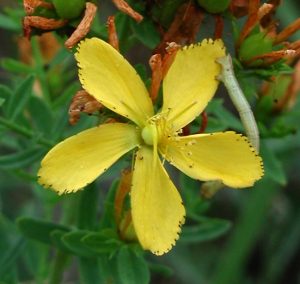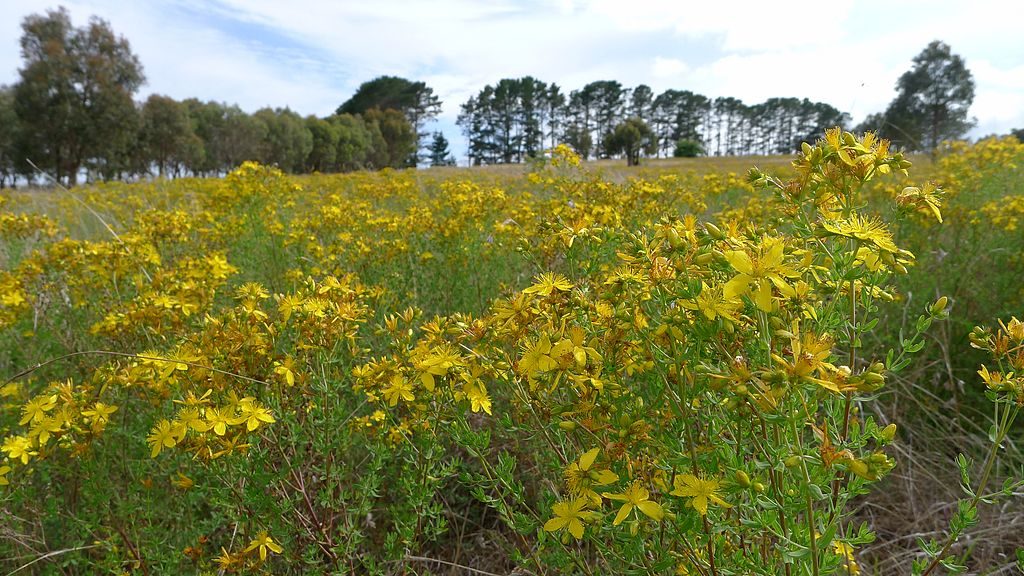St. John’s wort may promote deep sleep and mitigate sleep-disturbing conditions.

- Prolonging deep sleep. St John’s wort has been shown to extend the final stage of non-REM sleep.
- Mitigating sleep disturbances. The herb is believed to ameliorate health issues that can disrupt sleep, such as depression and anxiety.
Overview
St. John’s wort (Hypericum perforatum), native to various temperate regions of Europe and Asia, is a perennial plant with creeping roots and yellow flowers. It has a rich history of use in herbal medicine with references of its medicinal properties dating as far back as the Classical period.
In antiquity St. John’s wort was primarily offered as a temporary cure for skin wounds, but recent years have seen its use transition toward mental health. Indeed, clinical research suggests that St. John’s wort has potent nootropic properties, which include alleviation of anxiety and depression.1
Some also suggest its supplementation to relieve symptoms of stress and to facilitate sleep, especially because of its association with such brain chemicals as melatonin and serotonin.2 More on St. John’s wort for stress.

How St. John’s Wort Might Help With Sleep
Inhibiting neurotransmitter reuptake
St. John’s wort seems to simultaneously inhibit the reuptake of multiple neurotransmitters — such as serotonin and gamma-butyric acid — that play a role in sleep: 3 4 5
- Serotonin. The hyperforin in St. Johns wort has been shown to inhibit the reuptake of serotonin, a neurotransmitter that helps regulate sleep.6
- Gamma-butyric acid (GABA). The hypericin in St. John’s wort acts as a receptor antagonist of GABA, a calming neurotransmitter known to favor sleep.
St. John’s Wort Benefits & Uses for Sleep
St John’s wort is frequently taken to improve sleep. Although research on its effects on sleep is somewhat lacking, it may be beneficial by prolonging the duration of deep sleep – the stage of sleep believed to be most important for physical and mental recovery, and the one directly preceding REM sleep.
Albeit indirectly, St. John’s wort could also potentially improve sleep by ameliorating anxiety and mood disorders, including depression and seasonal affective disorder (SAD), that are widely recognized as causing sleep disturbances.7 In addition, one study found that the herb significantly improved sleep problems linked to menopause.8

Research
Animal Research
Research indicates that St. John’s wort may indirectly benefit animal sleep patterns by:
- Reducing oxidative stress and mild anxiety in sleep deprived mice9
Human Research
Clinical research has found that St. John’s wort primarily affects sleep patterns rather than overall sleep quality.
St. John’s wort (900 mg) may increase the time spent in deep sleep
In this double-blind, placebo-controlled investigation, 12 participants were given either a placebo or 300 mg of St. John’s wort 3 times a day during a 4-week period. St. John’s wort increased the time spent in deep sleep (also known as slow wave sleep) compared to the placebo but did not improve sleep continuity or sleep onset.
- The researchers concluded that “LI 160 induced an increase of deep sleep during the total sleeping period.”10
St. John’s wort (0.9 mg, 1.8 mg) might delay the onset of REM sleep
In this placebo-controlled investigation, participants were given a placebo, 0.9 mg of St. John’s wort, or 1.8 mg of St. John’s wort per day. Compared to the placebo, both doses of the herb significantly increased the latency to REM sleep without affecting other components of sleep.
- The researchers concluded that “hypericum significantly increased the latency to rapid eye movement (REM) sleep without producing any other effect on sleep architecture.”11
Dosage for Sleep
- Clinical studies have used from 0.9 – 900 mg of St. John’s wort per day.
- Typical supplements range from 60 – 300 mg daily servings of St. John’s wort standardized to 0.12 – 0.28% hypericin and 3 – 6% hyperforin.
Available Forms
- Dried extract in the form of capsules, tablets, or soft gels
- Aqueous (ethanol) extract
- Tea
Supplements in Review Says
- St. John’s wort 300 mg for sleep.
St. John’s wort has some potential as a sleep aid. While there isn’t enough evidence to recommend it outright, its antidepressant, anxiolytic, and deep sleep-promoting effects certainly suggest that St. John’s wort has some potential for improving sleep.
Take 300 mg of standardized St. John’s wort capsules. The ideal way to supplement with St. John’s wort seems to be to take it as a dried extract standardized to 0.12 – 0.28% hypericin and 3 – 6% hyperforin in capsule form.
Leave a Reply